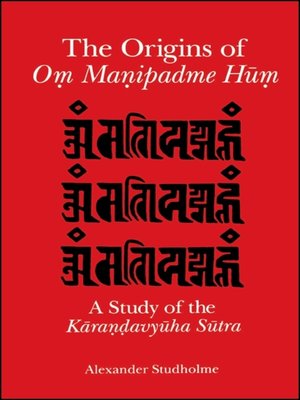
Sign up to save your library
With an OverDrive account, you can save your favorite libraries for at-a-glance information about availability. Find out more about OverDrive accounts.
Find this title in Libby, the library reading app by OverDrive.



Search for a digital library with this title
Title found at these libraries:
| Loading... |
Oṃ Maṇipadme Hūṃ, perhaps the most well-known of all Buddhist mantras, lies at the heart of the Tibetan system and is cherished by both layman and lama alike. This book documents the origins of the mantra, and presents a new interpretation of the meaning of Oṃ Maṇipadme Hūṃ, and includes a detailed, annotated precis of the Kāraṇḍavyūha Sūtra, opening up this important Mahayana Buddhist work to a wider audience.
The Kāraṇḍavyūha— the earliest textual source for Oṃ Maṇipadme Hūṃ—which describes both the compassionate activity of Avalokiteśvara, the bodhisattva whose power the mantra invokes, and the mythical tale of the search for and discovery of the mantra. Through a detailed analysis of this sutra, Studholme explores the historical and doctrinal forces behind the appearance of Oṃ Maṇipadme Hūṃ in India at around the middle of the first millennium C.E. He argues that the Kāraṇḍavyūha has close affinities to non-Buddhist puranic literature, and that the conception of Avalokiteśvara and his six-syllable mantra is informed by the conception of the Hindu deity Śiva and his five-syllable mantra Namaḥ Śivāya. The sutra reflects an historical situation in which the Buddhist monastic establishment was coming into contact with Buddhist tantric practitioners, themselves influenced by Saivite practitioners.
The Kāraṇḍavyūha— the earliest textual source for Oṃ Maṇipadme Hūṃ—which describes both the compassionate activity of Avalokiteśvara, the bodhisattva whose power the mantra invokes, and the mythical tale of the search for and discovery of the mantra. Through a detailed analysis of this sutra, Studholme explores the historical and doctrinal forces behind the appearance of Oṃ Maṇipadme Hūṃ in India at around the middle of the first millennium C.E. He argues that the Kāraṇḍavyūha has close affinities to non-Buddhist puranic literature, and that the conception of Avalokiteśvara and his six-syllable mantra is informed by the conception of the Hindu deity Śiva and his five-syllable mantra Namaḥ Śivāya. The sutra reflects an historical situation in which the Buddhist monastic establishment was coming into contact with Buddhist tantric practitioners, themselves influenced by Saivite practitioners.






